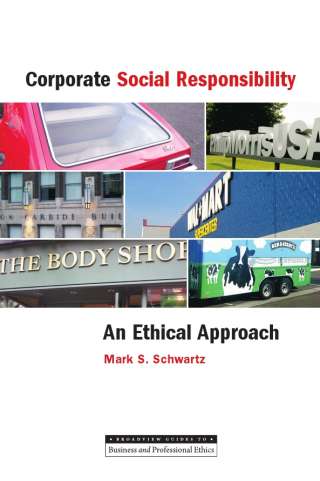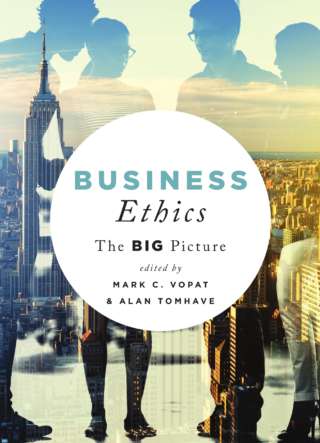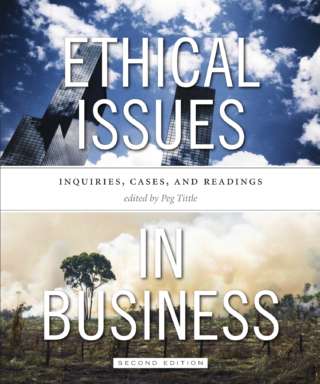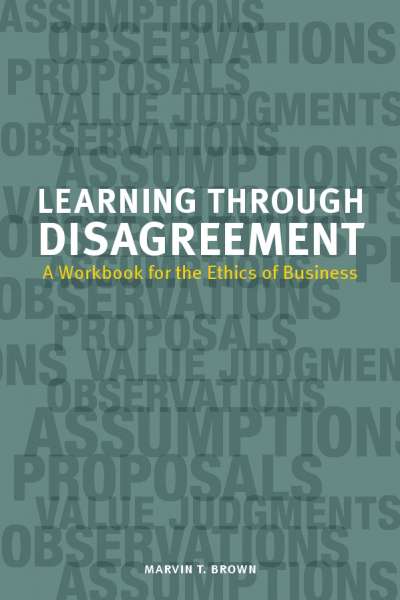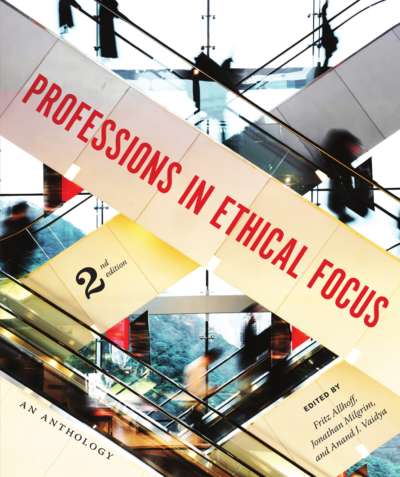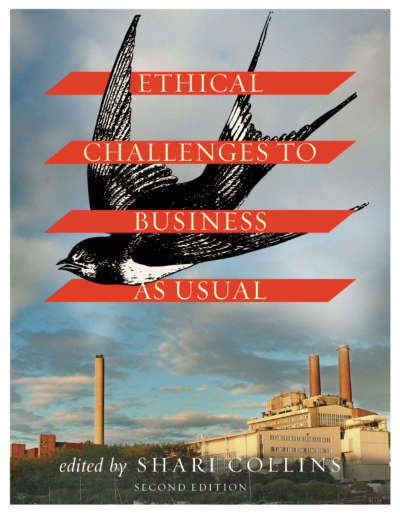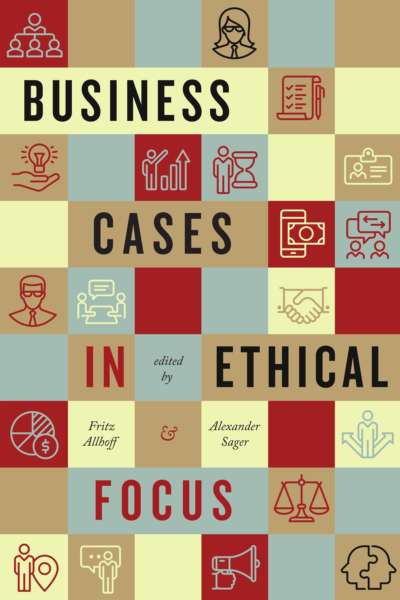Business in Ethical Focus is a compilation of classical and contemporary essays and case studies in business ethics. Readers will become acquainted with seminal ideas on corporate social responsibility and the place of business in a just society. Other topics include diversity in the workplace, sexual harassment, workplace rights, environmental responsibility and sustainability, global business, intellectual property, bribery, and ethical issues in advertising and marketing. This second edition adds a dozen original case studies, as well as new sections on global perspectives (with articles on Islamic, Confucian, and Buddhist business ethics), entrepreneurship, and the non-profit sector. Background material on ethical theory and the nature of business ethics is included to orient readers new to this field.
Comments
“Business in Ethical Focus is an excellent anthology for those who want to think about what really is right and wrong in business — not just about what causes people to do right and wrong. It contains a diversity of material and so is suitable both for those who want to focus on the justification of economic systems and those who want to focus on the ethics of specific business practices. It does all this for about half the price of its major competitors.” — Jeffrey Moriarty, Bentley University
“This is a truly comprehensive resource for courses in business and professional ethics. Virtually all of the standard topics covered in such courses are supported with well-chosen, up-to-date articles and case studies. Especially welcome, in my view, is the inclusion of foundational topics in management theory, economic analysis, and theories of distributive justice, which make the book appropriate not only for introductory-level courses but potentially for more senior-level seminars as well.” — William Buschert, University of Saskatchewan
“This is an excellent collection — touching on all of the major issues relevant to business ethics, from foundational questions about morality and the nature of business to cutting edge topics. The reach is global both in the sense of including discussion of problems arising international and around the world, and in including perspectives from many different sources and traditions. The inclusion of a discussion of the treatment and rights of workers is especially welcome and important, distinguishing this volume from many others.” — Matthew Lister, Wharton School of Business, University of Pennsylvania
Acknowledgments
Note on the Second Edition
Unit 1: Preliminaries
- Anand Vaidya and Fritz Allhoff, “Introduction: Why Study Business Ethics?”
- Foundational Issues
- Anand Jayprakash Vaidya, “Ill-Founded Criticisms of Business Ethics”
- Amartya Sen, “Does Business Ethics Make Economic Sense?”
- Linda Trevino, “Managing to Be Ethical: Debunking Five Business Ethics Mythis.”
- Systems of Moral Evaluation
- Alexander Sager, “A Brief Guide to Thinking about Business Ethics”
- David Meeler, “Utilitarianism”
- Heather Salazar, “Kantian Business Ethics”
- Richard M. Glatz, “Aristotelian Virtue Ethics and the Recommendations of Morality”
- Rita C. Manning, “Caring as an Ethical Perspective”
Unit 2: Corporate Social Responsibility
- Anand Vaidya, “Introduction”
- The Central Debate
- Elisabet Garriga and Domènec Melé, “Corporate Social Responsibility Theories: Mapping the Territory”
- Milton Friedman, “The Social Responsibility of Business Is to Increase Its Profits”
- Lynn Stout, “The Shareholder Value Myth”
- George G. Brenkert, “Private Corporations and Public Welfare”
- R. Edward Freeman, “Managing for Stakeholdersn”
- Joseph Heath, “Business Ethics Without Stakeholders”
- Sumantra Ghoshal, “Bad Management Theories are Destroying Good Management Practice”
- Case Study: David Meeler and Srivatsa Seshadri, “Actions Speak Louder than Words: Rebuilding Malden Mills”
- Case Study: Tom McNamara and Irena Descubes, “Citibank and Collateralized Debt Obligations”
- Case Study: Brad Berman, “Corporate Lobbying on GMO Labelling Legislation”
- Global Perspectives on Corporate Social Responsibility
- Gillian Rice, “Islamic Ethics and the Implications for Business”
- Gary Kow Yew Chan, “The Relevance and Value of Confucianism in Contemporary Business Ethics”
- Laszlo Zsolnai, “Western Economics Versus Buddhist Economics”
- Entrepreneurship and the Not-For-Profit Sector
- J. Gregory Dees, “The Meaning of ‘Social Entrepreneurship’”
- Deborah L. Rhode and Amanda K. Packel, “Ethics and Nonprofits”
- Case Study: Ardhendu Shekhar Singh, Dilip Ambarkhane, and Bhama Venkataramani, “Microlending and the Grameen Bank”
- Case Study: Joshua M. Hall, “Students Protest University Investments: Vanderbilt’s African Land-Grab”
Unit 3: Globalization and Sustainability
- Alexander Sager and Anand Vaidya, “Introduction”
- Ethics in International Contexts
- Manuel Velasquez, “International Business, Morality, and the Common Good”
- Thomas Donaldson, “Values in Tension: Ethics Away from Home”
- Ian Maitland, “The Great Non-Debate Over International Sweatshops”
- Don Mayer and Anita Cava, “Ethics and the Gender Equality Dilemma for US Multinationals”
- Case Study: David Meeler and Srivatsa Seshadri, “Charity Begins at Home: Nepotism”
- Case Study: Scott Wisor, “Conflict Minerals and Supply Chain Management: The Case of the DRC”
- Case Study: Theresa Bauer, “Google in China: Censorship Requirements Challenge the Internet Company”
- Bribery and Corruption
- P. Steidlmeier, “Gift Giving, Bribery, and Corruption: Ethical Management of Business Relationships in China”
- A.W. Cragg, “Business, Globalization and the Logic and Ethics of Corruption”
- Case Study: Peter Jonker, “Buying Influence in China: Avon’s Corruption Case in China”
- Environmental Responsibility
- Paul Hawken, “Natural Capitalism”
- Kristin Shrader-Frechette, “A Defense of Risk-Cost-Benefit Analysis”
- Deborah C. Poff, “Reconciling the Irreconcilable: The Global Economy and the Environment”
- Denis G. Arnold and Keith Buston, “Business, Ethics, and Global Climate Change.”
- Case Study: Cyrlene Claasen and Tom McNamara, “The Deepwater Horizon Oil Spill”
Unit 4: Rights and Obligations of Employees and Employers
- Anand Vaidya, “Introduction”
- Employment at Will
- Patricia H. Werhane and Tara J. Radin, “Employment at Will and Due Process”
- Richard A. Epstein, “In Defense of the Contract at Will”
- John J. McCall, “Employee Voice in Corporate Governance: A Defense of Strong Participation Rights”
- Case Study: David Meeler and Srivatsa Seshadri, “Lifestyles and Your Livelihood: Getting Fired in America”
- Whistleblowing
- Richard T. De George, “Whistleblowing”
- Juan M. Elegido, “Does It Make Sense to Be a Loyal Employee?”
- George Brenkert, “Whistleblowing, Moral Integrity, and Organization Ethics”
- Case Study: Brian J. Collins, “Obligations, Responsibility, and Whistleblowing: A Case Study of Jeffrey Wigand”
- Workplace Privacy
- Joseph DesJardins and Ronald Duska, “Drug Testing in Employment”
- Michael Cranford, “Drug Testing and the Right to Privacy: Arguing the Ethics of Workplace Drug Testing”
- Samantha French, “Genetic Testing in the Workplace”
- Darren Charter, “Electronic Monitoring and Privacy Issues in Business Marketing: The Ethics of the DoubleClick Experience”
- Case Study: Mike Bowern, “E-Mail and Privacy: A Novel Approach”
- Safety in the Workplace
- Anita M. Superson, “The Employer-Employee Relationship and the Right to Know”
- Tibor R. Machan, “Human Rights, Workers’ Rights, and the ‘Right’ to Occupational
Safety”
- Earl W. Spurgin, “Occupational Safety and Paternalism: Machan Revisited.”
- Case Study: Alexander Sager, “The Rana Plaza Collapse”
Unit 5: Justice and Fair Practice
- Anand Vaidya, “Introduction”
- Diversity in the Workplace
- Edwin C. Hettinger, “What Is Wrong with Reverse Discrimination?”
- Louis P. Pojman, “The Moral Status of Affirmative Action”
- Sandra E. Weissinger, “Gender Matters. So Do Race and Class: Experiences of Gendered Racism on the Wal-Mart Shop Floor”
- Sexual Harassment
- Anita M. Superson, “A Feminist Definition of Sexual Harassment”
- Stephen Griffith, “Sexual Harassment and the Rights of the Accused”
- Myrtle P. Bell, Mary E. McLaughlin, and Jennifer M. Sequeira, “Discrimination, Harassment, and the Glass Ceiling: Women Executives as Change Agents”
- Vicki Schultz,“The Sanitized Workplace.”
- Case Study: Darci Doll, “Sexual Harassment in the Workplace”
- Bluffing and Deception
- Albert Z. Carr, “Is Business Bluffing Ethical?”
- Thomas Carson, “Second Thoughts about Bluffing”
- Fritz Allhoff, “Business Bluffing Reconsidered”
- Case Study: Patrick Lin, “The Ethics of Bluffing: Oracle’s Takeover of PeopleSoft”
- Advertising
- Tibor R. Machan, “Advertising: The Whole Truth or Only Some of the Truth?”
- Robert L. Arrington, “Advertising and Behavior Control”
- Roger Crisp, “Persuasive Advertising, Autonomy, and the Creation of Desire”
- George G. Brenkert, “Marketing to Inner-City Blacks: PowerMaster and Moral Responsibility”
- Lynn Sharp Paine, “Children as Consumers: An Ethical Evaluation of Children’s Television
Advertising”
- Jean Kilborne, “Jesus is a Brand of Jeans”
- Case Study: Chris Ragg, “Nestlé and Advertising: An Ethical Analysis”
- Case Study: Sara De Vido, “Women and Advertising”
- Case Study: Brennan Jacoby, “Children and Targeting: Is it Ethical?”
Unit 6 Distributive Justice
- Fritz Allhoff, “Introduction”
- Classical Theories of Contracts, Property, and Capitalism
- Thomas Hobbes, Excerpts from Leviathan
- John Locke, Excerpts from The Second Treatise of Human Government
- Adam Smith, Excerpts from An Inquiry into the Nature and Causes of the Wealth of Nations
- Karl Marx, “Estranged Labor”
- Contemporary Theories of Distribution and Property
- Gerald Gaus, “The Idea and Ideal of Capitalism”
- John Rawls, Excerpts from A Theory of Justice
- Robert Nozick, Excerpts from Anarchy, State and Utopia
- Kai Nielsen, “A Moral Case for Socialism”
- G.A. Cohen, “Illusions About Private Property and Freedom”
- Case Study: Kyle Johannsen, “Distributive Justice: The Case of Café Feminino”
- Intellectual Property
- Edwin C. Hettinger, “Justifying Intellectual Property”
- Lynn Sharp Paine, “Trade Secrets and the Justification of Intellectual Property: A Comment on
Hettinger”
- Richard T. DeGeorge, “Intellectual Property and Pharmaceutical Drugs: An Ethical Analysis”
- Case Study: John Weckert and Mike Bowern, “Intellectual Property Across National Borders”
- Case Study: David Meeler and Srivatsa Seshadri, ”Copy That, Red Leader: Is File-Sharing Piracy?”
Fritz Allhoff is Professor of Philosophy at Western Michigan University.
Alexander Sager is Associate Professor of Philosophy at Portland State University.
Anand J. Vaidya is Associate Professor of Philosophy and Director of the Center for Comparative Philosophy at San José State University.


